June 19, 2025 | 14:39 GMT +7
June 19, 2025 | 14:39 GMT +7
Hotline: 0913.378.918
June 19, 2025 | 14:39 GMT +7
Hotline: 0913.378.918
Almost all nations in the world now recognize that developing agricultural production sustainably involves a focus on both output and volume improvement in order to meet food security requirements and offset the negative effects of unbeneficial variables on human health and the environment. To address the concerns, it is believed that the use of a biological plant protection agent (Bio PPA) is the best approach.
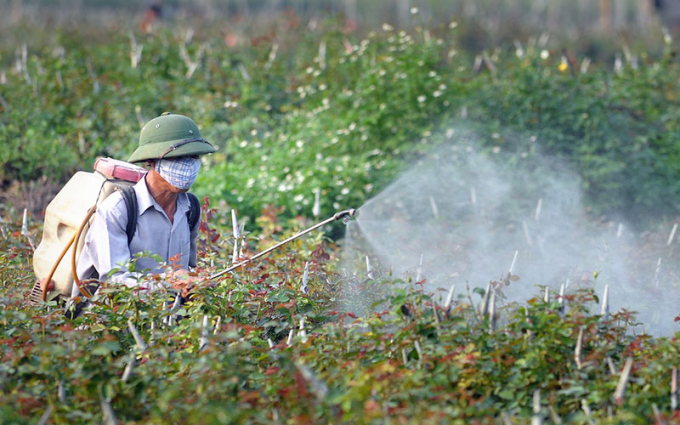
Vietnam's biopesticides market is expected to reach USD 65.7 million by 2024, with a growth rate of over 16.4% per year. Photo: TL.
According to a market analysis performed by Fortun Business Insights Pvt.Ltd (India), the growth rate of Bio PPA was around 24 percent between 2014 and 2017. Bio PPA was valued at USD 3.36 billion in 2017 and is forecast to reach USD 6.42 billion in 2023 and USD 10.19 billion in 2025.
Markets and Markets, a research firm specializing in agricultural material markets worldwide, forecasts that between 2022 and 2025, the global market share of preparations in the Macrobials microbial pesticides group will increase by 15.8 percent, reaching USD 2.2 billion (in 2020) and estimated at USD 4.6 billion (in 2025).
Bio PPA is estimated to reach USD 3.4 billion in 2025, with a 16.1 percent growth rate between 2020 and 2025.
According to a 2016 summary study of ten ASEAN member nations, Vietnam is the ASEAN leader in terms of the number and varieties of biological pesticides registered and utilized.
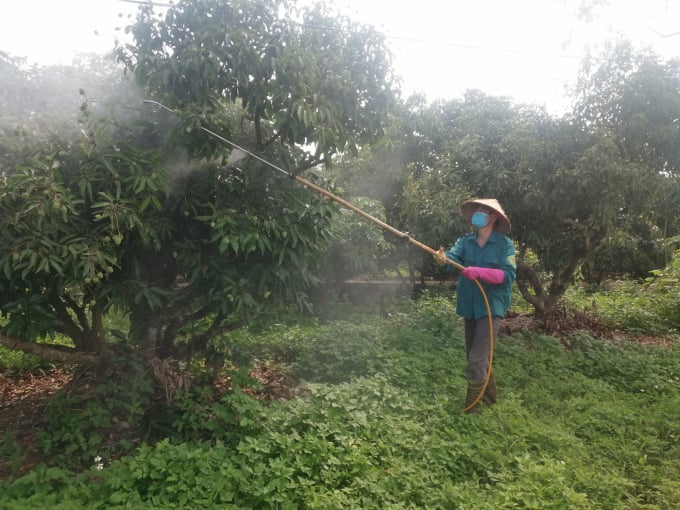
By June 2020, the list of pesticides permitted for use in Vietnam had 231 active ingredients with 721 trade names of biological pesticides, accounting for 18% of the total pesticides in the list. Photo: Trung Quan.
According to the Department of Plant Protection, Vietnam's biological pesticide market was worth USD 30.7 million in 2019 and is predicted to increase to USD 65.7 million in 2024, at a compound annual growth rate of more than 16.4 percent.
In terms of imports, Vietnam imports about 15,000 tons of biological pesticides annually, accounting for 15% of overall pesticide imports.
Vietnam imported around 16,100 tons of biological pesticides (approximately USD 50.8 million) in 2019, representing for 17% of total pesticide imports. However, efficient biological pesticides are composed of microorganisms, the majority of which are manufactured domestically, mostly by research institutions, universities, and certain enterprises specialized in the development and sale of biological medications.
According to the Department of Plant Protection, Vietnamese enterprises export biological pesticides to nine countries each year, capturing a significant share of the import market in Taiwan (155 tons), Cambodia (360 tons), Japan (70 tons), Singapore (36 tons), Laos (63 tons), Myanmar (50 tons), and China.
Currently, management units have issued a number of rules and circulars aimed at stimulating and facilitating the study, manufacturing, and use of Bio PPA.
Additionally, Bio PPA is urged to be registered on all crops, which will reduce the amount of bio-efficacy tests and isolation time tests. In comparison to chemical pesticides, records, technical paperwork, registration expenses, and implementation time are significantly reduced.
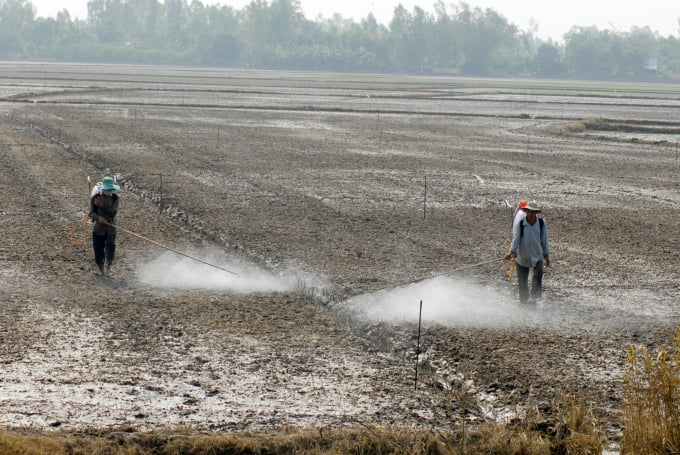
Currently, there have been many regulations, decrees, and guiding circulars on the encouragement and support of research, production, and use of biological pesticides. Photo: LHV.
Additionally, biological insecticides have been exempted from the processes for obtaining transport licenses under the legislation governing hazardous goods transportation.
As of June 2020, Vietnam's list of pesticides approved for usage included over 1,000 active ingredients with over 4,000 trade names. Which has 231 bioactive components with 721 trade names, accounting for 18% of all pesticides on the list.
According to the Department of Plant Protection, a total of 751 pest species have been recorded to far on 284 different crops. This includes the registration of biological pesticides to control 492 dangerous species on 190 crops (accounting for 65.11 percent of the total number of harmful organisms in the list).
Over 250 organizations and individuals have registered biological pesticides for use on important crops such as rice, vegetables, and fruits under one or more trade names.
Mr. Nguyen Van Son, President of the Vietnam Pesticide Association (VIPA), cited statistics indicating that while the number of biological pesticides registered in Vietnam has increased significantly since 2000, the majority of them continue to be imported from China, Japan, Korea, and the United States.
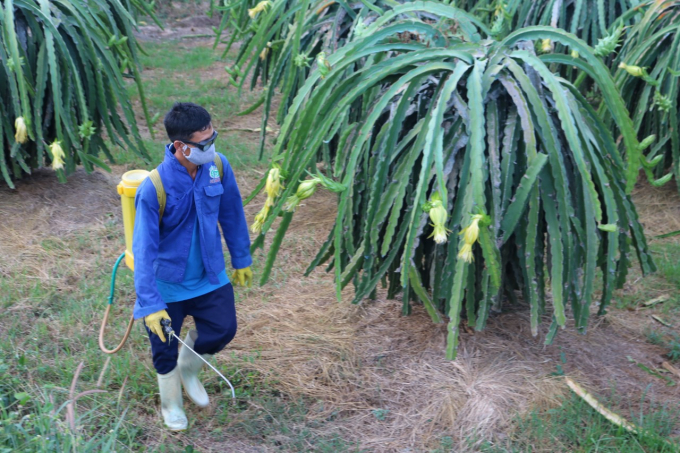
Need more policies to support and encourage the production, business, and use of biological pesticides. Photo: KS.
Although the number of biological pesticides rose significantly, sales of biological pesticides remained less than 10% of overall pesticide sales.
Apart from the benefits, many biological pesticides have certain drawbacks, such as lesser pest control efficiency and shorter shelf life than chemical pesticides.
Due to the product's high selling price, it is difficult to compete with other chemical goods. The packing procedure for imported pharmaceuticals is likely to be muddled and ambiguous, particularly when multiple varieties are blended. Additionally, no policy exists to encourage capital investment, workshop space, or the exemption or reduction of manufacturing and consumption taxes on biological pesticides.
There is currently a scarcity of information and recommendations on the safe use of biological insecticides for humans. Certain techniques for determining the precise concentration of microbes and pesticides extracted from herbs continue to confront challenges in setting quality control standards. As a result, the import, development, and regulation of biological pesticide products confront several obstacles. Additional stimulus measures are required.
The VIPA president anticipated that the Government and relevant ministries and sectors would continue to review and propose improvements to regulations, establishing favorable conditions for the registration of biological pesticides and new generation pesticides that are safe for humans and the environment, in order to continue promoting the development and use of biological pesticides and providing incentives for businesses to invest in this field.
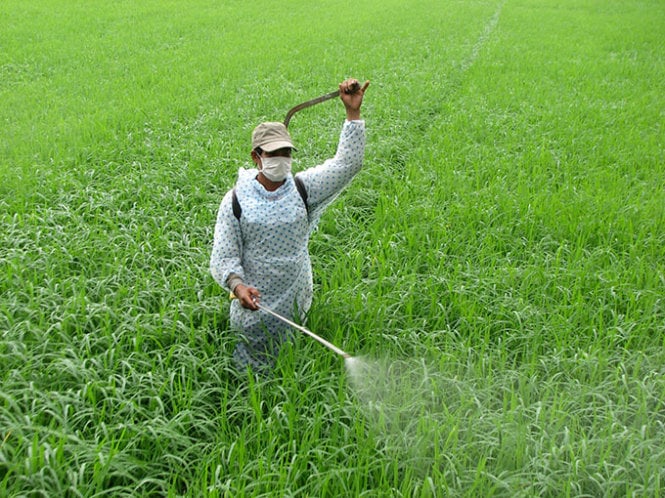
VIPA requested that the State study and explore a zero-percent import tax on biological pesticides and biological pesticide manufacturing technology lines. Photo: TL.
It is important to simplify rules, streamline the application procedure, and lower the cost of biological pesticide testing licenses and registration certificates.
Consolidate propaganda and support the development and use of biological insecticides. Concentrate efforts on crops with a high economic value that need strict food safety standards for export and home consumption.
Prioritize financing for research initiatives, as well as for the development, testing, and usage of viable biological pesticides, agricultural extension programs, and assistance for the production of biological pesticides.
To successfully execute the model of a chain of production and use of biological pesticides, a collaboration between management agencies, agricultural production institutions, organizations, and enterprises is required. From there, collaborate with media outlets to spread, reproduce, and duplicate the message throughout the country.
Additionally, VIPA requested that the State study and explore a zero-percent import tax on biological pesticides and biological pesticide manufacturing technology lines.
Continue to update, augment, and minimize legislation and circumstances governing the taxation of biological pesticide manufacturing and commerce. There are regulations that encourage capital investment, lease land for workshops, and exempt or cut taxes on biological pesticide manufacturing and use.
To address the problem of usage, it is vital to establish a policy that supports farmers who use biological pesticides in the initial stage by 30%-40%, as several nations now do.
Translated by Linh Linh
/2025/06/17/3942-2-143243_548.jpg)
(VAN) Recently, in Sweden, the Secretary of the Binh Dinh Provincial Party Committee presented the Investment Registration Certificate for the 'Polyester Fabric Recycling Complex' project to SYRE Impact-AB Company.
/2025/06/12/3721-2-202745_83.jpg)
(VAN) TH made an impression at Seoul Food 2025 with its line of natural beverages, paving the way for Vietnamese food products to enter the South Korean market.

(VAN) Soc Trang's success in rice exports stems from a strategy of developing fragrant and specialty rice cultivation areas and standardizing production toward low-emission practices.
/2025/06/11/1311-5-120811_839.jpg)
(VAN) The pig farming industry is facing the challenge of comprehensive restructuring to meet requirements for quality, safety, traceability, and market expansion both domestically and for export.

(VAN) Vietnam considers participating in ALGROALBA in order to expand agricultural production, coordinate the assessment and effective exploitation potential land.
/2025/06/05/5314-1-184727_407.jpg)
(VAN) From seemingly worthless fish scales and skin, enzymes and lactic ferments can transform by-products into peptides, opening a sustainable, effective business direction and elevating Vietnamese seafood.

(VAN) TTC AgriS and IFC signed a strategic partnership to develop a sustainable agricultural value chain, aiming to achieve the Net Zero target by 2035.